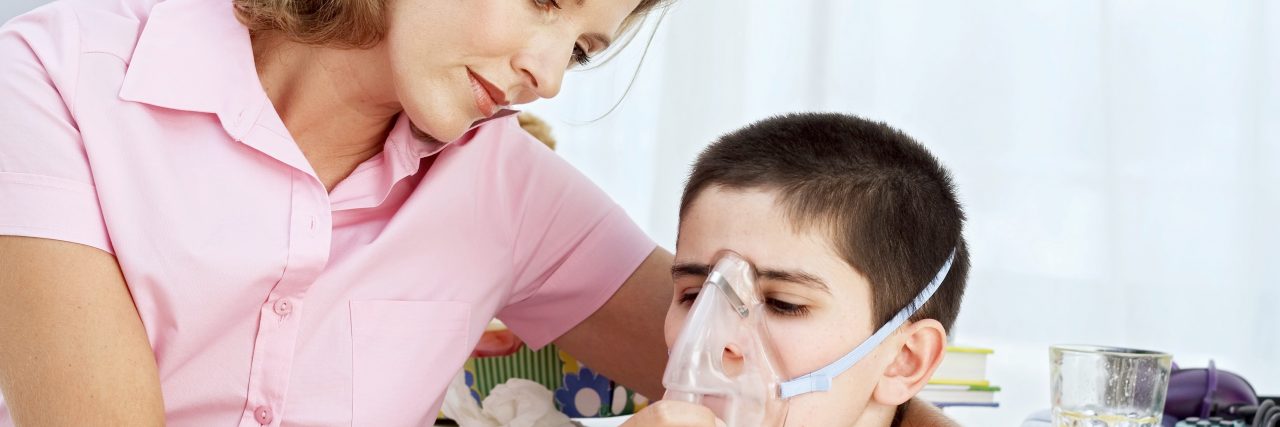The Challenges of Coping With the Progression of Your Child's Terminal Illness
This year went by in the blink of an eye, and there have been so many changes this year — honestly, too many to count.
Most of them didn’t come until September, and they have been life-changing.
If you are new to our story, hello and welcome. Our son Carter, aka “C-Money,” is currently 9 years old and is medically complex. When he was 18 months old, he was diagnosed with chronic pancreatitis due to a rare CRTC gene mutation. When he was just shy of 4 years old, he was diagnosed with Sanfilippo syndrome, a terminal illness in children that’s similar to a childhood version of Alzheimer’s Disease. There is currently no cure or treatment, but as a community, we have hope. Then in September, C’s portal vein thrombosis reared its head and has been causing GI bleeds, but we are not sure why exactly these bleeds are occurring.
There have been new fears I never knew we’d have, and since learning of them, they replay constantly in my mind. There’s no escaping the conditions, either. Almost daily, I speak to one of C’s doctors. I am reading articles they have sent me to review and discuss for our next appointment. I am updating them on how he is and what he has been doing. Talking with doctors has become so second nature, I disassociate about two to five minutes into the conversation. I go through the script in my head: “These are his current medications, and he is no longer taking x, y, and z. His digestion is (‘OK,’ ‘great,’ ‘eh’ — this varies by the day). He is doing OK for now” — you get the picture.
I sometimes feel like a new mom repeatedly worrying about every little detail in the hope that if any of it seems “odd,” we may catch it sooner, but I know there is no way that’s possible. You can only detect a bleed once it’s started, and even then, since there is no clear way to fix it right now, all we can do is give blood and hope it stops on its own.
And the falling. C’s become a bit less steady on his feet, almost as if his ankles give out and cannot bear weight. Typically, falls like that would worry me a little, but it wasn’t anything like it is now. Now, you can hear me let out a loud gasp pretty much any time he takes a fall. I try to remain calm and assess the situation. I have flawlessly achieved that goal on the exterior, but inside, full panic ensues. Within seconds, my mind has already developed three different scenarios of what is to come, what will happen, and how we need to cover it.
Welcome to the life of parenting a medically complex child. You have good days and bad days, and you genuinely cherish those good days, but sometimes the negativity of all the harder news consumes you, and it’s hard not to fall into a pit of despair. My therapist says it’s a bag of things that make this all happen. The anticipatory grief mixing with my post-traumatic stress disorder (PTSD) and anxiety points to depression on the horizon. Little does my therapist know, I’m already there. And do you know what I hate most about that?
The guilt.
I feel guilty All. The. Time. Guilty that I feel sad and in pain when I am not the one who is terminally ill. Guilty that I need to take mental health breaks to get through the day. I am filled with guilt that I cannot change any of the struggles and guilty that I am not at my best — because my kids and my husband deserve that.
The best advice I’ve gotten is from another mom of a child with Sanfilippo syndrome. Unfortunately, her son passed away in 2018 at 20 years old. She has helped countless families navigate Sanfilippo syndrome, and I have always admired her dearly.
I reached out, asking how to deal with the ever-impending guilt. Her advice was, “You actually need to learn to embrace the grief. Learn to walk with it, so it doesn’t overtake you. We learned to live in the moment, like literally every day was our last.”
We have been mentally preparing ourselves for this next chapter for the last five years. Thinking we somewhat knew what to expect and believed we were, as they say, “living as if you were dying.” But surprise, surprise — as adults, we’re all still learning. When you think you have a hold on life, it may throw you for dips, loops, and turns. Navigating a child’s terminal disease is no different.
These last few months have proven to be more difficult than I could ever imagine, and in speaking to others who have walked this path, I have learned that it does not get any easier.
Thank you for allowing me to share my thoughts and emotions with you. Although these are not the happy-go-lucky emotions you may be accustomed to seeing from us, I hope that being transparent with you will help you understand what we share in the future and relate a bit more to others who may be going through similar experiences.
Getty image by George Doyle.

